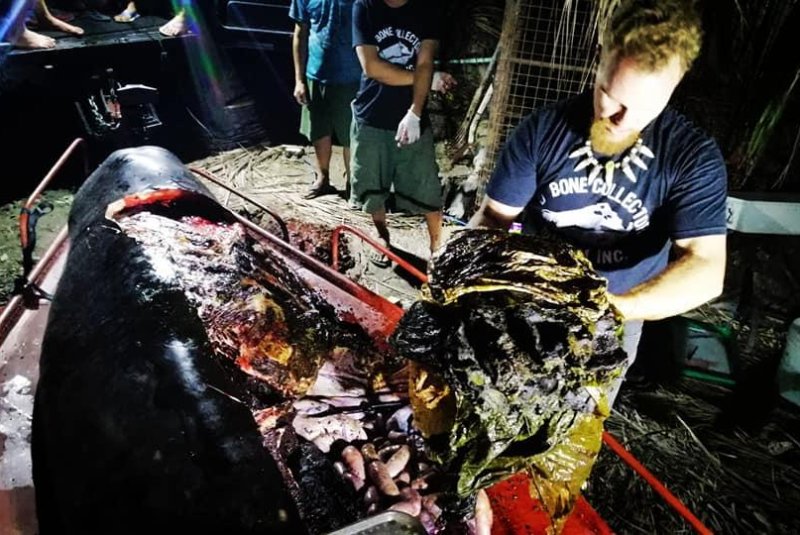Biologist Darrell Blatchley, owner of the D' Bone Collector Museum, where the necropsy was conducted, is pictured pulling plastic from the intestines of a dead Cuvier's beaked whale in the Philippines. Photo by D' Bone Collector Museum/Facebook
March 18 (UPI) -- After a dead whale washed ashore in the Philippines, scientists pulled 88 pounds of plastic debris from the mammal's intestines. The young Cuvier's beaked whale died from gastric shock, according to biologists.
The necropsy was conducted by scientists at the D' Bone Collector Museum. They were assigned by biologists with the Philippines Bureau of Fisheries and Aquatic Resources.
"This whale had the most plastic we have ever seen in a whale. It's disgusting," museum biologists wrote in a Facebook update. "Action must be taken by the government against those who continue to treat the waterways and ocean as dumpsters."
The Cuvier's beaked whale was found last week near the city of Mabini in the Southern Philippines. The necropsy was conducted over the weekend.
According to the owner of the museum, biologist Darrell Blatchley, the whale had been carrying the plastic in its stomach for a some time.
"The plastic in some areas was so compact it was almost becoming calcified, almost like a solid brick," Blatchley told the New York Times. "It had been there for so long it had started to compact."
There were 16 rice sacks among the plastic debris recovered from the whale's insides, as well as dozens of plastic bags. Because the whales can't digest or pass the large pieces of plastic, they remain in their guts, creating a false sense of fullness.
As a result, a whale plagued by ingested plastic can lose weight. Without the proper nutrition, the whale's energy levels can drop, making the mammal more vulnerable to predators.
"I was not prepared for the amount of plastic," Blatchley told CNN.
Scientists say plastic has killed several hundred large marine mammals in Southeast Asian waters over the last few years, but plastic pollution is a problem the world over.
Earlier this year, researchers reported finding plastic in all 50 of the deceased marine mammals dissected during a survey of necropsies along the British coastline. Another recent study recovered significant amounts of microplastic particles from deep sea creatures, species living among the ocean's deepest trenches.















